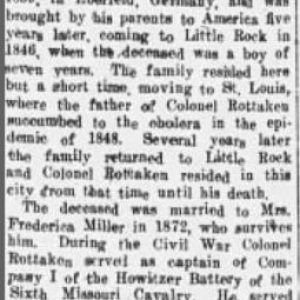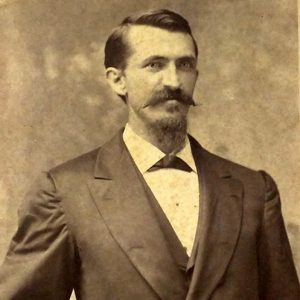calsfoundation@cals.org
Herbert H. Rottaken (1839–1908)
Herbert H. Rottaken was a larger-than-life presence in post–Civil War Little Rock (Pulaski County). A Union army officer during the Civil War, he moved to Little Rock in 1868 and, six years later, was a colonel in Governor Elisha Baxter’s militia during the Brooks-Baxter War. Afterward, he served as Pulaski County sheriff, chief of the city’s volunteer fire department, county assessor, and two-term city alderman. An ardent sportsman and renowned marksman, he was, the Arkansas Gazette declared, “as great a Nimrod as ever was.” In his eclectic business career, Rottaken was a successful planter, developer, inventor, and investor, often dealing in highly speculative ventures as well as conventional ones.
Herbert Rottaken was born in Elberfeld, in what is now Germany, on July 25, 1839. His parents brought him to the United States in about 1843, and the family lived in several places, including briefly in Little Rock, before settling in St. Louis, Missouri. There, his father (whose name remains unknown) died of cholera, and in March 1847, his widowed mother, Sophia (1812–1890), married Traugott Edward Thummler (1815–1867), a German immigrant. The 1850 census showed Herbert H. living in St. Louis with his mother, stepfather, sister, half-brother, and recently born half-sister.
When the Civil War started, Rottaken, residing in Warrenton, Missouri, enlisted as a sergeant in the Sixth Regiment of the Missouri Cavalry. He was wounded by a shot during the March 13, 1862, Action at Spring River in Arkansas, but he quickly recovered. Later in 1862, he received a commission as second lieutenant and spent several months in an inspector general staff position before returning as a captain to command a Sixth Regiment company during the 1864 Red River Campaign. By all accounts, he served with distinction.
After the war, he married Susan Trendley on April 18, 1865, the young daughter of a St. Charles, Missouri, farmer, and they settled in St. Louis. The couple moved to Little Rock in 1868 to open a liquor store. Described by the Arkansas Democrat as a man with “exceptionally social tendencies,” he gained quick notice by joining the Odd Fellows and the chamber of commerce; volunteering for the Defiance Hook and Ladder Co., quickly becoming its foreman; and convincing the state fair board to make pigeon shooting an annual competition, winning the grand prize the first three years it was held. The Arkansas Gazette reported that he kept a live bear in his store, ran an impressive pack of dogs, and was generous when pouring drinks.
Rottaken stumbled into Reconstruction politics when he inadvertently helped the regular Republicans (known as the Minstrels) thwart an attempt by reform-minded party members (Brindletails) to steal the 1870 municipal election. His action—kicking about thirty schemers out of the building in which his volunteer fire company kept its equipment—helped him get hired in 1872 as a Pulaski County deputy sheriff and appointed by the Minstrel acting governor, Ozro Hadley, to head the county’s voter registration board. The jobs were a godsend because his liquor business had failed and he needed employment.
He did not keep either position for long. Exhibiting the integrity and stubbornness that marked his character, he refused orders from Republican Party leaders to register some voters twice and to refuse to register others. He was quickly replaced by more compliant men.
While employed as a bartender in 1873, Rottaken was nominated by the Citizens’ Party (a surrogate for the Democratic-Conservative Party) to be its candidate for Little Rock mayor. He lost the election to the Republican nominee, Frederick Kramer, by a lopsided vote.
Rottaken’s fortunes soon changed for the better. When the Brooks-Baxter War started in April 1874, he joined Baxter’s hastily raised militia, serving first as inspector general and then chief of ordinance. When Baxter prevailed, many Republicans, including Pulaski County sheriff W. S. Oliver, fled the state to avoid possible arrest. In late May, Governor Baxter appointed Rottaken to fill Oliver’s putatively vacant position. Oliver challenged the appointment in court, but Rottaken kept the office and was elected to a two-year term in October; in 1876, he was re-elected, defeating a challenge from Oliver by 214 votes out of the 5,026 cast.
In 1876, Sheriff Rottaken’s wife died following a long illness. Two years later, Rottaken married Fredericka Reichardt Miller, the widow of Charles Miller, the co-owner of one of the city’s most successful grocery stores. Fredericka’s older sister, Adeline, was the wife of Frederick Kramer, Miller’s former business partner and Rottaken’s 1873 mayoral foe.
Throughout the 1870s and early 1880s, Rottaken held leadership positions in the city’s volunteer fire department, including chief. A contemporary described him as “forever without fear,” noting that he “always went in or on buildings before he ordered his men to do so.” His courage almost led him to his end in April 1877 when he, standing atop a tall ladder aiming a hose at a third-floor window, was knocked to the ground by an errant stream of water from another hose. He lay unconscious with a broken wrist and internal injuries.
After leaving the sheriff’s office, Rottaken began a career as a capitalist. He oversaw a cotton plantation eight miles south of Little Rock; bought, sold, and developed real estate; and invested in both conventional and unusual assets. His favorite investments included mining stocks, and his taste for speculative ventures led him to invest heavily in the Pearl Mining and Smelting Co. that, among other endeavors, searched for an old Spanish silver mine in Pulaski County. His investment portfolio also included the Little Rock Magnetic Infirmary and Institute that promised to cure most ills without drugs or surgery.
Rottaken was also an inventor. He and John R. Wherry, his Rector Street neighbor, patented four inventions. The most important were designs of a new streetcar fare box and a detachable receptacle to fit it. Both were patented in 1886 and briefly manufactured in Little Rock.
Rottaken also made time for public service. He was elected in September 1882 to be the Pulaski County assessor. After he took office, he concluded that the county’s poorer citizens paid an unfair share of taxes because affluent citizens lied about the true taxable value of their property. To remedy the problem, he increased the total assessed value of personal property by nearly forty percent. His actions were furiously opposed by the most influential men in the city, and the board of equalization rolled back most of his assessments. Although Rottaken did not seek a second term, he returned in 1888 to serve several years as a governor-appointed member of the county’s board of equalization, and in that position, he continued to promote property tax fairness.
Rottaken remained active and influential in the Democratic Party until the end of his life. The party nominated him for a seat on the city council in 1901 and 1903, and he won both elections, representing the seventh ward for four years. Also, the state’s Democratic governor, Simon Hughes, appointed him to the three-member fish commission in 1886. He was elected its chairman and promoted action to protect the state from illegal and harmful fishing practices.
In his later years, Rottaken frequently visited the Big Lake Hunting and Fishing Club, a 1,200-acre members-only reserve he helped create about fifteen miles southeast of Little Rock. Its clubhouse was a short walk from the Rottaken station on an Iron Mountain rail line. It was at this resort that on September 16, 1908, he accidently shot himself with a rifle, nearly severing his left arm, as he attempted to board a small boat. He died the next day from the wound.
He was survived by his wife, Fredericka, who died from spinal meningitis in April 1911. Both are buried at Mount Holly Cemetery in Little Rock. He was also survived by three stepdaughters, Julia Miller Rutland (1868–1950), Rose Miller (1872–1950), and Amelia Miller Black (1875–1950).
For additional information:
Durning, Dan. “Little Rock’s Last Reconstruction Mayor: Frederick Kramer Beats Herbert H. Rottaken in the 1873 Election to Become Mayor during Times of Financial Distress, Fakirs, and Political Strife, Then to Abandon the Republican Party.” Pulaski County Historical Review (Forthcoming).
“H. H. Rottaken Is Killed.” Arkansas Democrat, September 17, 1908, p. 8.
“The Investigating Committee.” Arkansas Gazette, July 29, 1874, p. 4.
Miller-Rottaken Family Collection. BC.MSS.10.20. CALS Butler Center for Arkansas Studies. Central Arkansas Library System, Little Rock, Arkansas.
“The Next Assessment. A Red Hot Interview with Assessor H. H. Rottaken.” Arkansas Gazette, January 31, 1884, p. 5.
“Our Neighbor Rottaken.” Arkansas Gazette, August 31, 1869, p. 4.
“Rottaken.” Arkansas Gazette, July 8, 1870, p. 4.
Dan Durning
Birch Bay, Washington



 Rottaken Death Article
Rottaken Death Article  Herbert Rottaken
Herbert Rottaken 



Comments
No comments on this entry yet.